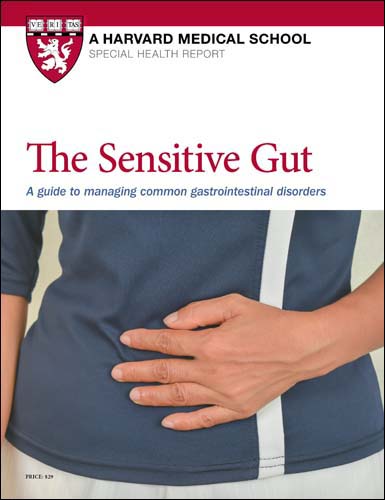
Less butter, more plant oils, longer life?

Healthier planet, healthier people

Counting steps is good — is combining steps and heart rate better?

Appendix pain: Could it be appendicitis?

Can saw palmetto treat an enlarged prostate?

How does Ozempic work? Understanding GLP-1s for diabetes, weight loss, and beyond

Zinc: What it does for the body, and the best food sources

Respiratory health harms often follow flooding: Taking these steps can help

Tips to leverage neuroplasticity to maintain cognitive fitness as you age

Can white noise really help you sleep better?


Better Bladder and Bowel Control
Most people take bladder and bowel control for granted — until something goes wrong. An estimated 32 million Americans have incontinence, the unintended loss of urine or feces that is significant enough to make it difficult for them to maintain good hygiene and carry on ordinary social and work lives. The good news is that treatments are becoming more effective and less invasive. This Special Health Report, Better Bladder and Bowel Control, describes the causes of urinary and bowel incontinence, and treatments tailored to the specific cause.
Other Product Information
Most people take bladder and bowel control for granted — until something goes wrong. An estimated 32 million adults have incontinence, the unintended loss of urine or feces that is significant enough to make it difficult for them to maintain good hygiene and carry on ordinary social and work lives. What’s the cause? For women, it’s typically a rarely discussed but common result of childbirth and aging. For men, it’s most often a side effect of treatment for prostate problems.
The good news is that treatments are becoming more effective and less invasive. For example, today’s medications for urinary incontinence are easier to use than earlier ones. Exercises can help strengthen the muscles of the pelvic floor, shoring up those that control both bladder and bowel. Surgical options include less invasive outpatient procedures that can work as well as older, open surgical procedures.
This Special Health Report, Better Bladder and Bowel Control, describes the causes of urinary and bowel incontinence and treatments tailored to the specific cause.
Better Bladder and Bowel Control was prepared by the editors of Harvard Health Publishing in consultation with Liliana Bordeianou, MD Professor of Surgery, Harvard Medical School; Chief, Pelvic Floor and Colorectal Surgery Centers, Massachusetts General Hospital Kristin J. Hung, MD Instructor, Harvard Medical School; Urogynecology and Reconstructive Pelvic Surgeon, Division Director of Quality and Clinical Operations, Massachusetts General Hospital Jacqueline M. Speed, MD Urogynecology and Reconstructive Pelvic Surgeon, Mass General Brigham, 49 pages. (2025)
Debunking a myth: You do not need eight cups of water a day
The old advice to drink at least eight glasses of water a day no longer holds water, so to speak— particularly if you are prone to urinary incontinence. Instead, 48 ounces to 64 ounces a day—six to eight cups—is fine. And that total includes all fluids, not just water.
Another myth is that you should drink enough water to produce clear urine. In fact, normal urine should be as yellow as a legal pad or Post-it note. If your urine is clear or almost clear, you are probably drinking more fluid than you need.
- Urinary incontinence
- Anatomy of urinary continence
- Types of urinary incontinence
- Evaluating urinary incontinence
- The physical exam
- Urodynamic testing
- Other evaluation procedures
- Treating urinary incontinence
- Bladder training
- Fluid management
- Pelvic floor exercises
- Medication to treat urinary incontinence
- Stimulation devices for overactive bladder
- Injections
- Surgery
- SPECIAL BONUS SECTION: Coping with urinary incontinence
- Fecal incontinence
- Anatomy of fecal continence
- What can go wrong?
- Evaluating fecal incontinence
- The physical exam
- Testing
- Treating fecal incontinence
- Diet and medication
- Pelvic muscle conditioning
- Other nonsurgical approaches
- Surgical treatments
- Coping with fecal incontinence
- Skin care
- Reducing odor
- Containment and collection options
- Enemas and suppositories
- Emotional concerns
- Resources
- Glossary
You might also be interested in…

The Sensitive Gut
When your digestive system is running smoothly, you tend not to think about it. Once trouble begins, your gut — like a squeaky wheel — suddenly demands your attention. This Special Health Report, The Sensitive Gut, covers the major sources of gastrointestinal distress: irritable bowel syndrome, gastric reflux, upset stomach, constipation, diarrhea, and excess gas. It also includes a special Bonus Section describing how emotional stress and anxiety can cause gastrointestinal distress.

Less butter, more plant oils, longer life?

Healthier planet, healthier people

Counting steps is good — is combining steps and heart rate better?

Appendix pain: Could it be appendicitis?

Can saw palmetto treat an enlarged prostate?

How does Ozempic work? Understanding GLP-1s for diabetes, weight loss, and beyond

Zinc: What it does for the body, and the best food sources

Respiratory health harms often follow flooding: Taking these steps can help

Tips to leverage neuroplasticity to maintain cognitive fitness as you age

Can white noise really help you sleep better?
Free Healthbeat Signup
Get the latest in health news delivered to your inbox!
Sign Up

